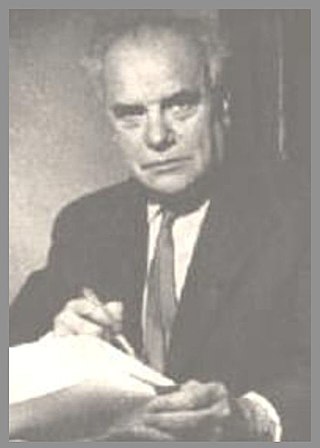Related Research Articles

Der Stahlhelm, Bund der Frontsoldaten, commonly known as Der Stahlhelm, was a German First World War veteran's organisation existing from 1918 to 1935. In the late days of the Weimar Republic, it was closely affiliated to the monarchist German National People's Party (DNVP), placed at party gatherings in the position of armed security guards.

The All-German Bloc/League of Expellees and Deprived of Rights was a right-wing political party in West Germany, which acted as an advocacy group of the Germans fled and expelled in and after World War II.

Franz Seldte was a German politician who served as the Reich Minister for Labour from 1933 to 1945. Prior to his ministry, Seldte served as the Federal Leader of Der Stahlhelm World War I ex-servicemen's organisation from 1918 to 1934. Ideologically, he identified as a national conservative.

Ernst Wiechert was a German teacher, poet and writer.

The Wachbataillon is the German Bundeswehr's honour guard. The Wachbataillon number about 1,000 soldiers stationed in Berlin. It consists of seven active companies and belongs to the Streitkräftebasis of the Bundeswehr. The soldiers of the Wachbataillon often refer to themselves as Protter or Protokollsoldaten, meaning protocol soldiers.

Jutta Rüdiger was a German psychologist and head of the Nazi Party's female youth organisation, the League of German Girls, from 1937 to 1945.

Theodor Oberländer was an Ostforschung scientist and German Nazi official and politician, who after the Second World War served as Federal Minister for Displaced Persons, Refugees and Victims of War in West Germany from 1953 to 1960, and as a Member of the Bundestag from 1953 to 1961 and from 1963 to 1965.

The National Committee for a Free Germany was a German anti-Nazi organisation that operated in the Soviet Union during World War II.

The Reichsbanner Schwarz-Rot-Gold was an organization in Germany during the Weimar Republic with the goal to defend German parliamentary democracy against internal subversion and extremism from the left and right and to compel the population to respect and honor the new Republic's flag and constitution. It was formed by members of the left-wing Social Democratic Party of Germany (SPD), the centre-right to right-wing German Centre Party, and the centrist German Democratic Party in February 1924.

The National Socialist League of the Reich for Physical Exercise was the umbrella organization for sports and physical education in Nazi Germany. The NSRL was known as the German League of the Reich for Physical Exercise until 1938. The organization was expanded to Austria after that country's annexation by Nazi Germany.

The "Queen Louise League" was a German monarchist women's organization. It was established in 1923 during the time of the Weimar Republic and lasted until the first years of Nazi Germany. This organization was inspired by the figure of Louise of Mecklenburg-Strelitz, Queen of Prussia, who was held in reverence by many Germans of the time. The Bund Königin Luise had a youth branch - the Kinderkreis.

The Deutschvölkischer Schutz- und Trutzbund was the largest and the most active antisemitic federation in Germany after the First World War, and an organisation that formed a significant part of the völkisch movement during the Weimar Republic (1918–1933), whose democratic parliamentary system it unilaterally rejected. Its publishing arm issued books that greatly influenced the opinions of Nazi Party leaders such as Heinrich Himmler. After the organisation folded in around 1924, many of its members eventually joined the Nazis.
Werner Conze was a German historian. Georg Iggers refers to him as "one of the most important historians and mentors of the post-1945 generation of West German historians." Beginning in 1998, Conze's role during the Third Reich and his successful postwar career in spite of this became a subject of great controversy among German historians.
Erwin Oberländer is a German historian and expert on Eastern European history. He is Professor Emeritus of Eastern European History at the University of Mainz. He is also a former President of the German Association of Historians of Eastern Europe, and was appointed by the Latvian government as a foreign member of the Commission of the Historians of Latvia, which was tasked with studying crimes against humanity in Latvia during the Soviet and Nazi occupations.
The Bund: Gemeinschaft für ein sozialistisches Leben was a German Socialist organization founded in 1924 by Artur Jacobs. Dore Jacobs created within this "Bund" a method of physical education which became a mode of resistance under Nazism and is still taught in Germany, in the same place in which it originated.
The League of Jewish Women in Germany was founded in 1904 by Bertha Pappenheim. Pappenheim led the JFB throughout the first twenty years of its existence, and remained active in it until her death in 1936. The JFB became increasingly popular through the 20th century. At its peak in 1928, the organization had 50,000 members from 34 local branches and 430 subsidiary groups. At the time, the JFB was Germany's third largest Jewish organization, with 15-20% of Jewish women in Germany becoming members.

Paula Grogger was an Austrian writer.
Notker Hammerstein was a German historian. His research interests were mainly in the field of University history and history of science as well as the history of the Holy Roman Empire of the German Nation.

Paul Sethe was a German writer and journalist.
References
- ↑ Ingo Haar, Historiker im Nationalsozialismus. Deutsche Geschichtswissenschaft und der „Volkstumskampf“ im Osten, Göttingen 2000
- ↑ Philipp–Christian Wachs "Der Fall Theodor Oberländer (1905–1998): Ein Lehrstück deutscher Geschichte", Frankfurt/Main; New York Campus-Verl. 2000, ISBN 3-593-36445-X
- ↑ Anna Rosmus: Hitlers Nibelungen, Samples Grafenau 2015, pp. 77f